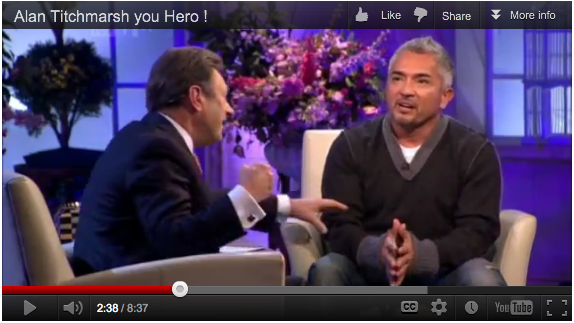Of all the topics we tackle on DogTime, two in particular are so polarizing, the mere idea of addressing either again sends my internal anxiety meter up to eleven. One of them is dog breeding. The other is Cesar Millan.
So when a friend sent me the link to this footage last month, I hesitated to… well, bite. I wasn’t sure whether reacting in writing to a recent Cesar Millan interview would lead to discussion (the goal) or hate comments (not so much the goal).
In the clip, British television host Alan Titchmarsh sits down with Nat Geo’s Dog Whisperer for a live conversation. He asks Millan the tough questions, setting the stage by reminding him his techniques have been called old-fashioned, controversial, and even barbaric. “I’ve seen you punch a dog in the throat to get him to behave,” Titchmarsh begins.
I have to admit I squirmed; it’s awkward to watch anyone confronted with such intensity. But the questions were fair (I’m paraphrasing below — the 8-minute interview is worth checking out in its entirety) and deserved a response:
· How do you defend using what many consider to be unacceptable dog training methods, such as shock collars, punching, and kicking?
· How do you justify presenting these methods on television, knowing people will misuse your techniques and misinterpret your objective?
· Why do you continue to promote pack mentality theory, which is based on research of wolves in captivity, an environment altogether different from that of domestic dogs’?
Except for a few fleeting glimpses of irritation, Millan keeps that cool for which he’s so famous. He explains the punching by assuring Titchmarsh it’s actually a touch (no matter how the interaction comes across on tv), and it’s performed to “snap the dog out of” whatever he’s focused on. As far as shock collars and other aversive instruments, he says he’s simply showing owners the proper way to use tools already in their possession. As for “pack,” that’s his way of saying “family” — semantics.
Millan doesn’t go too much deeper than that, and when he does expound, his anecdotes address the concerns somewhat indirectly. For instance, when Titchmarsh asks why he continues to use punishment (shocks or jabs or kicking a dog in his underbelly), Millan responds by saying he also uses food (meaning rewards) as a training mechanism.
Touch versus punch. Pack versus family. Semantics perhaps. But is this really the venue to be goofing around with the thesaurus? The potential for misunderstanding is too high.
For softies like me, the philosophy behind reward-based positive reinforcement training feels right. But it’s the method’s efficiency that gives it credibility. You do x, you earn a treat. (So much clearer and more effective than punishing the dog for all the non x behaviors he might offer.) And while no single tactic is guaranteed to work perfectly with every single dog, I’ve seen reward-based positive reinforcement, in its various incarnations, work effectively and reliably with both simple obedience training and a huge range of behavior issues.
That’s not to say Millan is a bad person or completely off the mark in all his methods. I agree that a calm, confident energy is a big part of success. I also think he’s right that most training is about getting the human to understand the process. And I’m thoroughly grateful for his commitment to Pit Bulls.
In some ways, my conflicted feelings about Millan mirror my ambivalence toward animal welfare organizations in general. HSUS, for example, deserves huge props for its role in advancing the humane treatment of farm animals. In other areas, I couldn’t disagree more with their choices and statements. But on the whole, I believe the good work they do outweighs the negatives.
Is the same true for Millan? For me (for now), the means are too unsound to justify the end.










